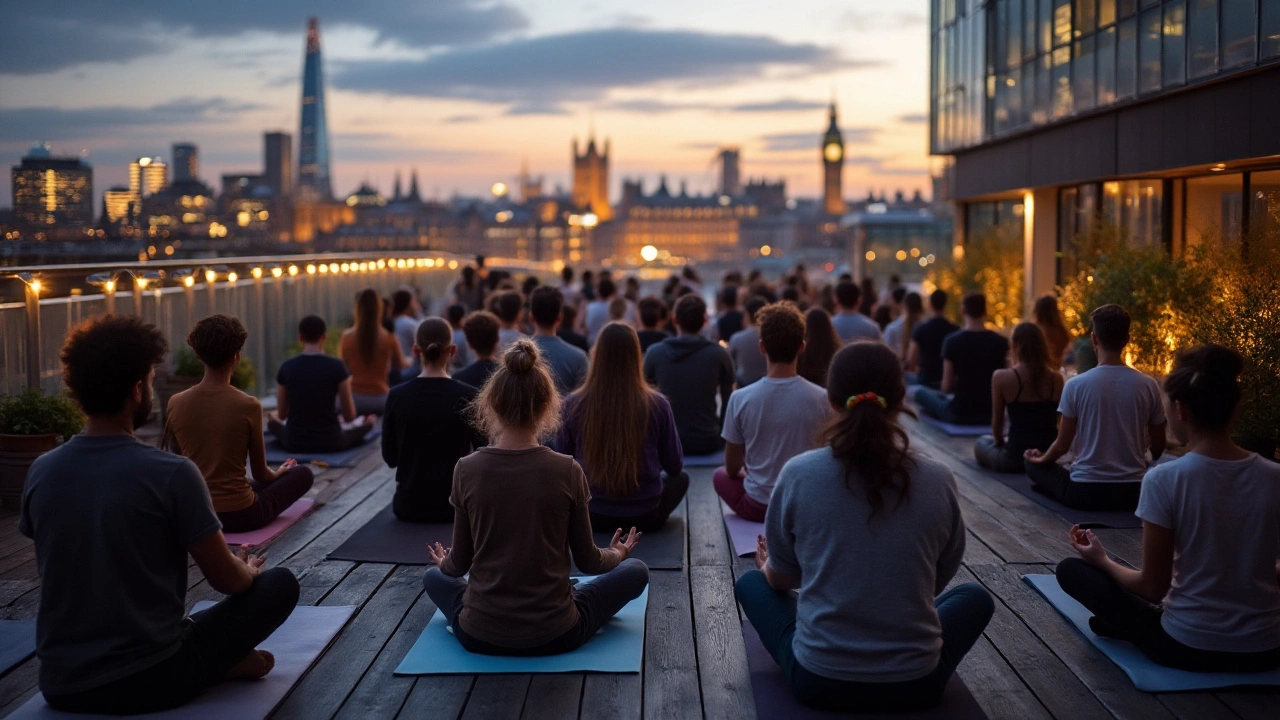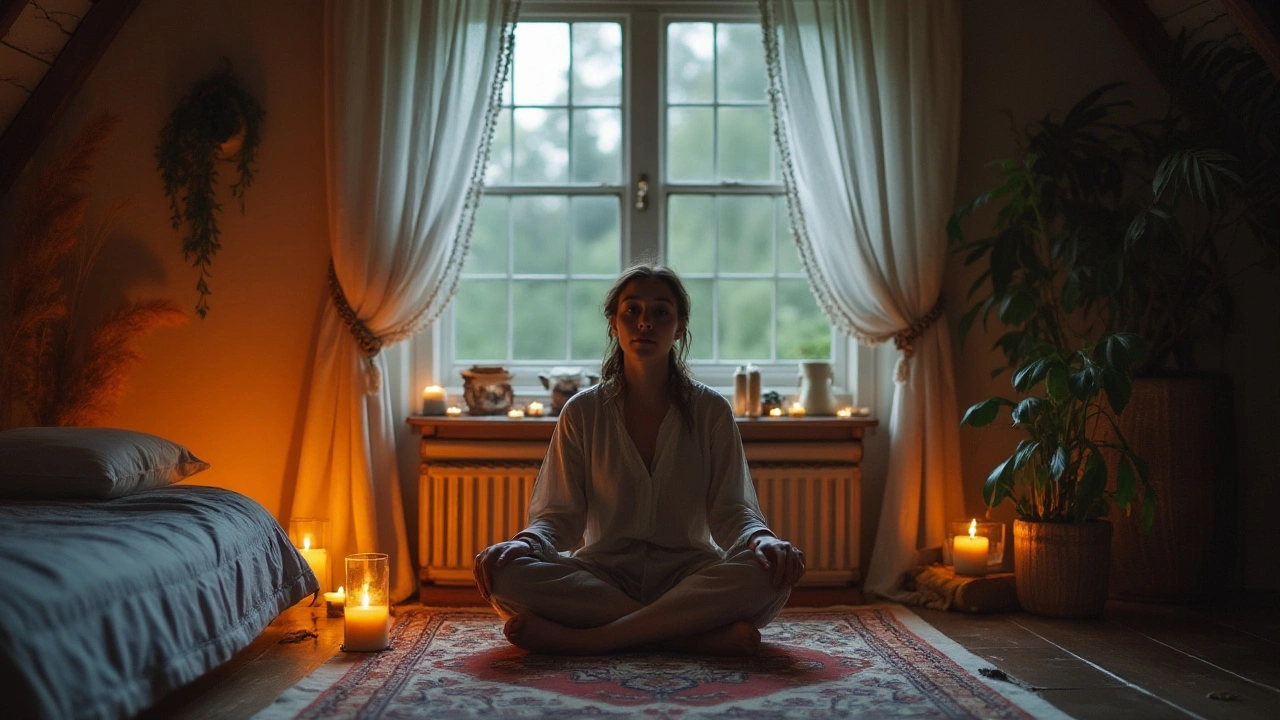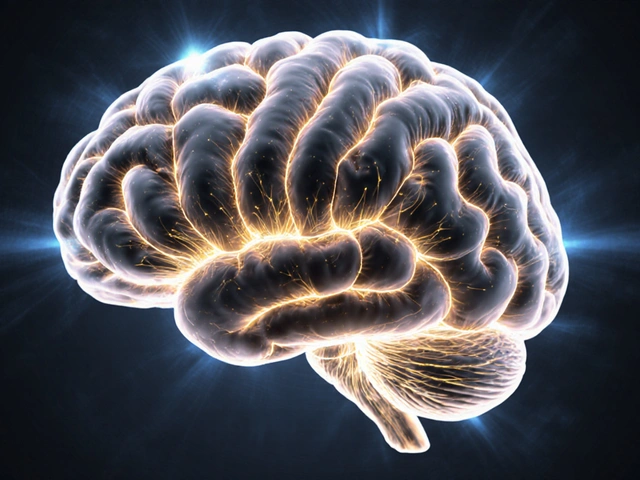In the restless world we live in, a good night's sleep often seems elusive. Insomnia, a condition that affects millions globally, continues to be a thorn in the side of peaceful slumber. Amidst various remedies, meditation emerges as a gentle yet powerful ally in the quest for restful sleep.
The roots of meditation stretch back thousands of years, flourishing in cultures across the globe, from the tranquil forests of ancient India to the serene Zen gardens of Japan. It's more than just a tool for mindfulness; for many, it's a pathway to a night of uninterrupted, restorative sleep.
Science backs what ancient wisdom has long suggested – meditation can significantly improve sleep quality. By engaging in meditative practices, individuals can enter a state of deep relaxation, preparing both the body and mind for the kind of rest that rejuvenates.
This article ventures deeper into how meditation can turn sleepless nights into dream-filled ones. By understanding its profound impact and learning simple, effective techniques, you can harness meditation to reclaim tranquil nights.
- Understanding Insomnia
- The Science Behind Meditation
- Benefits of Meditation for Sleep
- Practical Meditation Techniques for Better Sleep
- Creating a Meditation Routine
- Real-Life Success Stories
Understanding Insomnia
Insomnia is not just a simple inconvenience or a matter of a sleepless night now and then. It's a complex sleep disorder that infiltrates the lives of millions, transforming nights into a seemingly endless waking battle against rest. According to the National Institute of Health, approximately 30% of adults report symptoms related to insomnia, with about 10% experiencing chronic insomnia that affects their daily functioning. The struggle to find rest can be crippling, impacting mental health, cognitive function, and overall quality of life. The causes of insomnia are varied; they include stress, anxiety, depression, and even certain medications or medical conditions. But sometimes, insomnia can appear with no obvious trigger at all, which makes it even more frustrating for those who suffer from it.
The symptoms of insomnia stretch beyond just difficulty falling asleep. It can mean waking up frequently during the night or waking up too early and not being able to return to sleep. Affected individuals often experience tiredness and lethargy during the day, irritability, and difficulty concentrating. These effects create a vicious cycle; the more one worries about their inability to sleep, the harder it becomes to achieve the restful state necessary for sleep. Interestingly, research has shown that one of the strongest predictors of insomnia is a history of anxiety or depression. These mental health challenges often magnify the experiences of insomnia, making it crucial to address them in tandem.
With its widespread impact, insomnia remains a concern for public health experts. It is linked to numerous adverse outcomes, including increased risk of cardiovascular diseases, obesity, and even diabetes. The economic burden is notable too, leading to loss of productivity and increased health care costs. As various treatment options are explored—ranging from cognitive behavioral therapy and medications to lifestyle changes—meditation stands out as an appealing alternative because of its natural approach.
Meditation offers a practical solution by tackling one of the root causes of insomnia: mental hyperactivity. By calming the mind, meditation can reduce the anxious thoughts that often keep people awake at night. A systematic review and meta-analysis published in JAMA Internal Medicine highlighted significant improvements in sleep quality for individuals who practiced mindfulness meditation. This emphasizes the potential of meditation to not only reduce insomnia symptoms but also enhance overall mental well-being. For anyone seeking to reclaim their nights from the clutches of insomnia, understanding its nuances is a critical first step. With knowledge comes the power to seek effective solutions—at times, in the gentle, rhythmic peace of mindful meditation.
The Science Behind Meditation
Meditation, often heralded as a pathway to tranquility, carries with it a robust body of scientific research that decrypts its mystical aura into understandable reality. Central to this process is its effect on the brain, particularly the prefrontal cortex and amygdala. Regular meditation practices are shown to enhance the functioning of the prefrontal cortex, the brain area responsible for rational thought, decision-making, and social behavior. By doing so, it naturally reduces the activity in the amygdala, which is the hub of our fight-or-flight responses and stress reactions. When this balance is achieved, the cycle that keeps you staring at the ceiling after lights-out begins to break, making way for the blissful lull of sleep.
Studies emphasize that meditation increases the thickness of the hippocampus, a region crucial for learning and memory. The thickening essentially means better cognitive capacities which might explain heightened awareness and improved attention spans observed in meditators. More interestingly, meditation boosts serotonin levels, a key hormone in sleep regulation. A rested body is a precursor to increased serotonin levels, and science evidently suggests that serotonin deeply affects the rapid eye movement (REM) phase of sleep, critical for effective rest. Thus, a peaceful mind naturally fosters a conducive platform for sleep initiation and promotion.
Regular meditative practices have been shown to invoke the relaxation response, a term coined by Dr. Herbert Benson of Harvard Medical School. This relaxation response, a counterpart to the stress-provoking fight-or-flight response, includes decreased metabolism, heart rate, and slower breathing. Meditation trains the mind to respond with this relaxation response, especially during bedtime when stress levels tend to peak. The science here is basic yet profound: meditation enhances the alpha, theta, and delta wave activities in your brain, all of which are deeply connected to a relaxed and meditative state.
"The mind is everything: what you think, you become," Buddha once meditated upon this thought. This is notably backed up by contemporary studies indicating that meditation demands only the power of your mind for effective outcomes. Empowering, isn't it?Furthermore, MRI scans of individuals who participate in meditation display a decrease in the size of their amygdala. This physical change heralds the capacity of meditation to alter structure, not just function, further explaining the drastic reduction in anxiety and improvements in sleep these individuals experience.
In a compelling research study at the University of Massachusetts, it was found that participants who meditated consistently for a period showed significant improvements in both the duration and quality of their sleep compared to those who didn't. Data presented in their findings revealed that nearly 60% of participants were able to reduce reliance on sleep-inducing medications after incorporating meditation into their daily regimen.

Benefits of Meditation for Sleep
For many struggling with sleepless nights, meditation offers a ray of hope. Meditation is a practice that calms the mind, reducing the incessant chatter that often intrudes upon peaceful sleep. One of the primary benefits is its ability to naturally lower stress levels. When stress is under control, the hormone cortisol decreases, making it easier to relax and fall asleep. Imagine lying down at night, free of the anxious thoughts that usually run rampant. Regular meditation can create this kind of mental tranquility.
Interestingly, practicing meditation also increases the production of melatonin in the body. Melatonin is a hormone directly tied to the sleep-wake cycle. When produced at the right levels, it signals your body that it is time to unwind. This subtle change can transform a restless bedtime into a serene process of drifting off. A study published in the "Journal of Clinical Sleep Medicine" found that mindfulness meditation significantly improved sleep quality among insomniacs, heightening its credibility as a sleep aid.
The effects of insomnia relief through meditation are not merely subjective but have a scientific foundation. Research indicates that meditation enhances slow-wave sleep, the deepest phase of non-rapid eye movement sleep critical for physical restoration. It is during this sleep phase that the body can repair itself and bolster the immune system. Consistent meditation practitioners often wake up feeling refreshed, indicating a more restorative sleep cycle.
Beyond the physiological advantages, meditation imparts a sense of emotional balance. By focusing attention inward, individuals become aware of their mood and mental state, facilitating emotional well-being. In the context of sleep, this emotional regulation means fewer nighttime awakenings and reduced sleep interruptions due to emotional distress. This can be particularly beneficial for those whose sleep is disrupted by nightmares or stress-related awakenings.
"Meditation and mindfulness training can alter human psychological processes and cortical activity, which may enhance various health outcomes, including improved sleep," noted Dr. Herbert Benson, a pioneer in the field of mind-body medicine.
Moreover, meditation's impact on the autonomic nervous system plays an essential role in sleep optimization. By fostering a parasympathetic response, often called the 'rest and digest' mode, meditation helps slow heart rate and decrease blood pressure, creating a ready-to-sleep state. This is in stark contrast to the sympathetic nervous system's 'fight or flight' response that keeps individuals alert and wired long into the night.
The expanding body of evidence supporting meditation's role in sleep improvement indicates that this ancient practice holds a timeless ability to soothe and repair. Whether it’s through mindfulness meditation, guided imagery, or focused breathing techniques, the pathway to a restful night can be as simple as closing one’s eyes and gently guiding their mind to a space of peace and calm.
Practical Meditation Techniques for Better Sleep
Incorporating meditation into your nightly routine doesn't require a grand overhaul. To many, it feels like a gentle nudge in the right direction. Imagine yourself easing into the night with techniques specifically designed to tackle insomnia head-on. Initiating this journey toward better sleep is simpler than it might seem, and the potential benefits are well worth the commitment.
1. Mindful Breathing Meditation
The simplest form yet often the most profound. Start by finding a comfortable position in a quiet room. Let your body relax, feel your muscles loosen. Focus your attention on your breathing. Inhale slowly through your nose, feel the air filling your lungs completely, then exhale gently through your mouth. Counting your breaths can help keep your mind anchored. Do this for several minutes each evening, easing your way into restful nights.
Interestingly enough, studies have shown that mindful breathing significantly lowers stress levels and reduces symptoms of insomnia. A study published in JAMA Internal Medicine found that those who practiced mindful meditation reported less insomnia, fatigue, and depression compared to a control group. This underscores the transformative effect a few moments of focused breathing can have.
2. Body Scan Technique
This method involves mentally scanning each part of your body, releasing tension that might disrupt your sleep. Begin at your toes, acknowledge their presence and let the tension dissolve. Gradually move upwards, paying attention to each segment of your body. Feel your feet, legs, torso, arms, and finally your head. Each part of your body deserves and receives your attention, allowing relaxation to cascade over you.
"The body scan is one of those methods that works like magic for insomnia," says Dr. Michael Irwin, a professor of behavioral sciences at UCLA. "It lets your body know that it’s okay to let go and enter a restful state."
This technique promotes a connection with your bodily sensations, fostering a deep relaxation that's ideally suited for easing into sleep. It's especially effective for bringing attention away from swirling thoughts.
3. Guided Visualization
Enter the realm of dreams even before you close your eyes with guided visualization. This technique involves creating peaceful and calming images in your mind. Picture a quiet beach, waves gently lapping at the shore. Or find solace in a tranquil forest, leaves whispering secrets on the breeze. Guided visualization often comes paired with audio tracks designed to assist your journey – blending nature sounds with calming narration to transport you to your serene landscape.
In fact, research from the University of Hertfordshire reveals that visualization before bed can help reduce sleep latency, helping individuals fall asleep faster. This dreamy journey invites not just slumber, but a quality rest that is deeply restorative.
Incorporating these techniques into a nightly ritual is a step toward reclaiming your nights from the grips of insomnia. While consistency is key, flexibility is your friend. Mix and match techniques as needed, allowing your practice to evolve and adapt to your personal needs. Unlock the natural pathway to improved mental health through meditation, and find the peaceful sleep you've been yearning for.

Creating a Meditation Routine
Developing a meditation routine is akin to planting a garden; it's about consistency, patience, and finding the right conditions to flourish. If you've ever struggled with insomnia, you know the feeling of being trapped in a cycle where the more you hope for sleep, the more elusive it becomes. A meditation routine can break this cycle by anchoring your mind to a place of calm each evening.
Begin by selecting a specific time each night to dedicate to meditation. Just like brushing your teeth, making it a non-negotiable part of your routine builds habit strength. The timing isn’t as critical as consistency—some people find meditating about 30 minutes before bed works wonders, while for others, an hour provides the needed separation from day to night. Choose a setting that promotes tranquility, perhaps a quiet corner of your bedroom. You might choose to dim the lights or light a scented candle to create an atmosphere that signals to your brain that it’s time to wind down.
The meditative practice itself doesn’t have to be elaborate. Research suggests that just ten minutes of mindfulness breathing can reduce stress and increase relaxation. Sit or lie in a comfortable position, close your eyes, and focus on your breath. Feel the rise and fall of your chest, the sensation of air filling your lungs and slowly leaving your body. If thoughts intrude, gently guide your attention back to your breathing. This repetitive focus can help shift your mind away from the day’s distractions, making room for peaceful, restorative sleep.
For a guided experience, numerous apps and online resources offer timed meditations tailored to those troubled by sleeplessness. Headspace, for instance, provides sleepcasts and wind-down podcasts specifically crafted to help listeners transition into sleep mode. Studies show that guided meditations can significantly aid those new to practice by reducing the mental effort required to remain focused.
"Meditation is not about stopping your thoughts, but recognizing that we are more than our thoughts," reads a popular mantra from the team at Mindspace. It illustrates that meditation is a state of mindfulness that enables one to notice thoughts instead of being overwhelmed by them.
Tracking your progress can add layers of motivation. Keep a meditation journal where you reflect on each session. Write about the feelings that arose during practice, areas of improvement, and the impact on your sleep. Over time, this log reveals patterns and benefits you might overlook in daily life. Consistency breeds proficiency, and before long, you'll notice how effortlessly you slip into this peaceful state.
Consider complementing your meditation routine with practices that prepare your body for sleep. Sip on herbal tea as you meditate or follow it with a few gentle stretches. This holistic approach attunes both mind and body to the cadence of relaxation, optimizing your environment and mindset for insomnia relief.
Real-Life Success Stories
Many people who once lay awake, staring at the ceiling, have found solace and genuine relief from their insomnia through the practice of meditation. It's not just anecdotal; there are countless stories where individuals have transformed their restless nights into serene, restful slumber with the help of meditation. Let's take a closer look at some of these heartening journeys. One such story is that of Rebecca, a 35-year-old marketing executive, who, like so many, found herself tossing and turning for hours. After a particularly grueling few months at work, the sleepless nights began to take their toll. She tried all the usual remedies, from warm milk to prescription sleep aids, none of which brought more than temporary relief. In a desperate bid to reclaim her nights, she turned to meditation.
Rebecca committed to a nightly meditation session, guided by an app on her phone. The process was gradual, with the first few sessions feeling like another futile attempt to quiet her mind. But then, something clicked. After a couple of weeks, she noticed a change; her mind no longer raced with endless lists of things to do. Over a few months, meditation created a peaceful pre-sleep ritual that helped her slip effortlessly into sleep. Now, Rebecca sleeps soundly, with a marked improvement in her daytime energy and focus.
Then there's Michael, a former insomniac who chronicled his journey on his blog. Michael, a software developer in his late 20s, struggled with insomnia since college. His story resonates with many who find their sleep patterns disrupted by excessive screen time and an irregular schedule. After reading about the benefits of meditation, he began incorporating it into his evening routine. At first skeptical, he soon became a believer. Within months, Michael was not only sleeping better but also experiencing a sense of calm during his waking hours that he hadn't felt in years.
The statistics also support these success stories, illustrating the growing recognition of meditation's role in sleep improvement. A study published in JAMA Internal Medicine indicated that mindfulness meditation helps insomniacs significantly reduce sleep disturbances. According to the study, participants who meditated reported a 60% improvement in their sleep quality compared to those undertaking traditional approaches. These figures highlight the transformative potential of meditation practice.
"Meditation is a simple practice available to all, which can reduce stress, increase calmness and clarity, and promote happiness," said Scientific American. This acknowledgment from a respected source underscores why so many now turn to meditation as a first-line remedy for insomnia.
These stories remind us that while sleep solutions abound, sometimes the answer lies in simplicity. Meditation doesn't just address the symptoms of insomnia but helps tackle the underlying mental restlessness that so often disturbs our sleep. It's a personal journey towards peace of mind and restful nights, showing that with commitment and patience, meditation can truly be a key to unlocking restful sleep.







